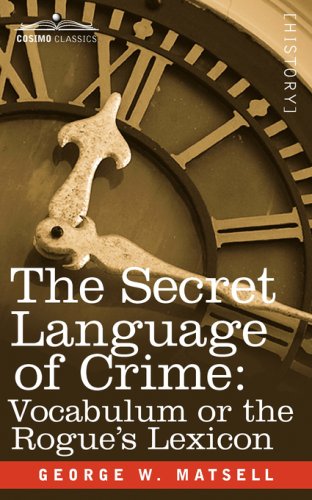Crime Pays Language
By Peter LloydBecause criminals live outside the law, they find themselves forced to improvise. Law-abiding citizens rely on legal systems that prove to be more reliable and predictable. Living within the law requires less creativity. Crooks, on the other hand, must call upon their creative powers more often and at a moment’s notice.
According to Mark Twain, “There are several good protections against temptation, but the surest is cowardice.” Must we who overcome temptation and behave in line with the law think of ourselves as cowardly and uncreative? Perhaps a measure of our creativity lies in our language.
 Just take a peek at The Secret Language of Crime compiled in 1859 by George W. Matsell, a most creative law enforcer.
Just take a peek at The Secret Language of Crime compiled in 1859 by George W. Matsell, a most creative law enforcer.His book, The Secret Language of Crime: Vocabulum or the Rogue’s Lexicon, catalogs hundreds of expressions used by criminals at the time. Matsell compiled the book to help his less verbally imaginative officers understand the jargon of the streets.
Under one letter, C, I found a treasure of language invention and innovation. Better than what most everyday people come up with and comparable to what people in the business of inventing language originate. All of the following C-words fine tune what what we lamely call bad guys: cadger, cab moll, canary bird, cannis cove, captain heeman, captain topper, cat, cow, and crow.
A cache of C-words has survived to this day: cave (to give in), cheese (to stop), collar (to arrest), confidence man, crack (to force open), croak (to die), and crib (a house).
I also found what I regard as most colorfully expressive: chatty feeder (a spoon), christening (changing the name on a stolen watch), claret (blood), cock one’s toes up (to die), cold pig (a person who has been robbed of his clothes), corn thrasher (a farmer), crabs (feet), cupboard love (loving only for personal benefit), and cut one’s eyes (to begin to see, become suspicious).
You could say, “Conscience does make cowards of us all,” but Hamet already did while contemplating whether or not to exact justice outside the law. But you don’t have to take up crime to color your language.
Peter Lloyd spent two years studying to be a Franciscan priest, drove taxicabs and school buses, ran a picture framing gallery, worked on a farm, was a warehouseman, a US Census enumerator, and even took a few odd jobs.
Right Brain Workouts Explained
